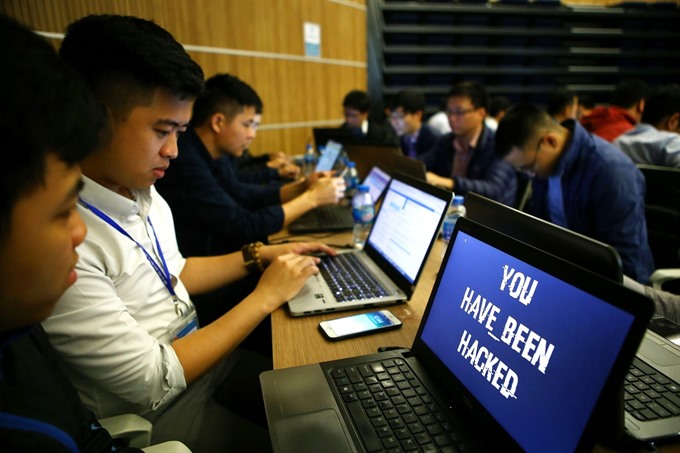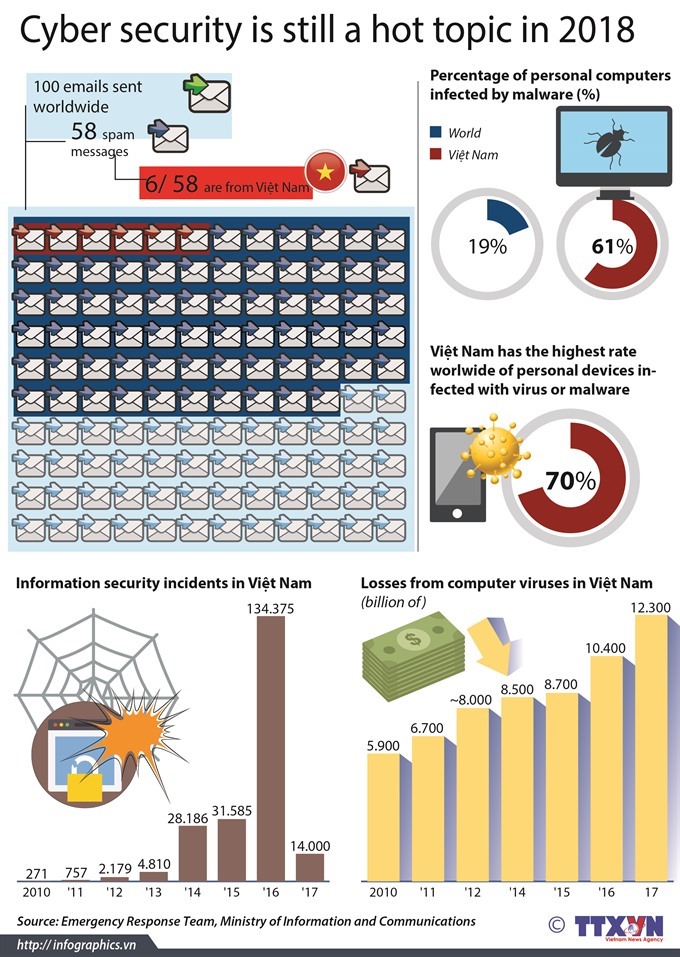The Viet Nam Computer Emergency Response Team (VNCERT) yesterday said that within the two first months of 2018, Vietnamese websites came under a total of 1,504 cyber attacks in the forms of defacing, malware and phishing.

The Viet Nam Computer Emergency Response Team (VNCERT) yesterday said that within the two first months of 2018, Vietnamese websites came under a total of 1,504 cyber attacks in the forms of defacing, malware and phishing.
The information was released in an international cyber security exercise drill held by VNCERT on Wednesday across the three largest cities in the country, Ha Noi, Da Nang and HCM City.
Under the theme “Data breach via malware on Internet of Things,” the drill was joined by several computer security incident response teams from 20 countries and territories in the Asia-Pacific region, including ASEAN countries, Japan, South Korea, China, Taiwan, Australia and India – many of which are members of the Asia-Pacific Computer Emergency Response Teams (APCERT).
Nguyen Khac Lich, deputy director of VNCERT, said the exercise aims to be “as close to a real attack” as possible. The drill aims at equipping 300 IT workers and officials in the VNCERT network – including State agencies and local governments – with necessary skills and knowledge to respond to threats by malware on internet-connected devices. The participants are meant to learn how to collect and verify information, analyse the pattern and behaviour of the malware, trace the originator and then build a response, restore the system and warn others of the threats.
The event was also considered an opportunity for IT professionals in Viet Nam to learn from world experts and to share the experience with the international IT community.

With Viet Nam frequently finding itself listed amongst countries with low information security, serious cyber threats will continue to be a pressing issue, given that the country is becoming more and more connected, said Nguyen Thanh Hung, Deputy Minister of Information and Communications.
Last year, the Government issued Directive 16 to advance the capacity of State agencies and authorities in accessing Industry 4.0. In the future, when the fourth industrial revolution permeates all activities and sectors, weak guards against attacks could mean a loss of control of artificial intelligence system, robots and industrial production activities (for example, the Supervisory Control and Data Acquisition) to hackers, leading to “devastating consequences,” Hung added.
“Through this drill, I call on heads of State agencies to have proper awareness of the need for cybersecurity, and especially, give IT staff more and better chances to improve themselves, for example, by joining cybersecurity drills,” he said.
The security firm Kaspersky put Viet Nam at the fourth place in its January 2010 list of the top 10 countries with the most botnet devices, including PCs, servers or mobile devices, which are infected by a certain malware that allows these devices to be remotely controlled by a bot herder from anywhere in the world. Similarly, last year, Kaspersky’s report showed that Việt Nam and Taiwan were the two entities having most infected devices in the world, cautioning against the rise of malware that could “piggyback” on the popular trend of IoT. — VNS





